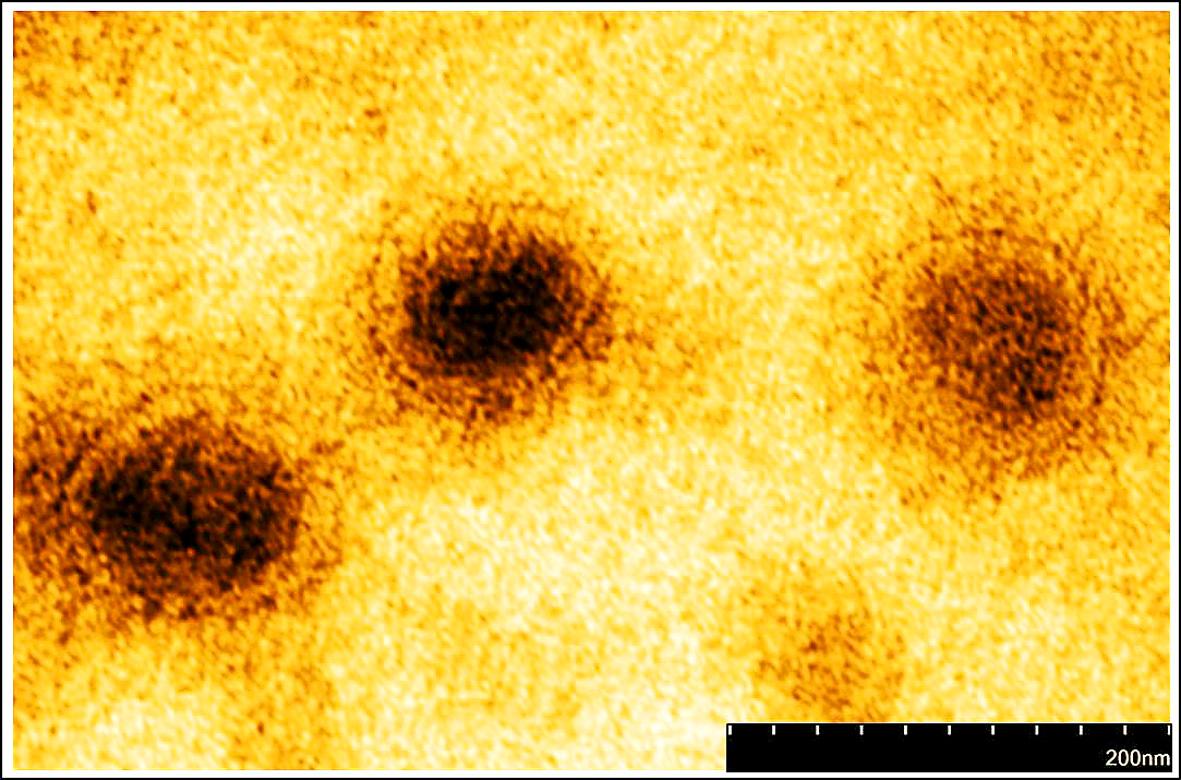Chang Gung Memorial Hospital yesterday said that it has collaborated with other institutes to isolate 22 new strains of SARS-CoV-2 and complete the full genome sequencing of the virus, which causes COVID-19.
A team of researchers has also found 25 strains of antibodies in beta-cells collected from three COVID-19 patients, said Huang Kuan-ying (黃冠穎), a doctor at the Department of Pediatric Infectious Diseases at the hospital’s Linkou branch.
The hospital found that a monoclonal antibody combined with the coronavirus’ spike protein could help inhibit angiotensin converting enzyme-2 (ACE2) and prevent the virus entering the body.

Photo courtesy of Chang Gung Memorial Hospital
ACE2 is an enzyme attached to the membranes of lung, artery, heart, kidney and intestine cells, and is the main entry point for coronaviruses.
Chang Gung University Research Center for Emerging Viral Infections head Shih Shin-ru (施信如) said the antibody could be used to prevent the virus from replicating itself in the human body.
If the antibody proves effective in human trials, it could be used as a treatment for COVID-19 or used in prevention, she said.
The antibody, which originates from the human body, would be much safer to use than antibodies originating from animals, she added.
She suggested that the strains of antibodies be used in permutations for rapid test kits, as it would increase test kit sensitivity and specificity toward SARS-CoV-2.
The hospital also said that it would work with the team to develop a test kit and conduct human trials, adding that it would also reach out to the local pharmaceutical industry to help develop a treatment.
The hospital’s collaborators include Academia Sinica, the National Defense Medical Center’s Graduate Institute of Medical Sciences and a team from the University of Oxford.

Taiwan is stepping up plans to create self-sufficient supply chains for combat drones and increase foreign orders from the US to counter China’s numerical superiority, a defense official said on Saturday. Commenting on condition of anonymity, the official said the nation’s armed forces are in agreement with US Admiral Samuel Paparo’s assessment that Taiwan’s military must be prepared to turn the nation’s waters into a “hellscape” for the Chinese People’s Liberation Army (PLA). Paparo, the commander of the US Indo-Pacific Command, reiterated the concept during a Congressional hearing in Washington on Wednesday. He first coined the term in a security conference last

Prosecutors today declined to say who was questioned regarding alleged forgery on petitions to recall Democratic Progressive Party (DPP) legislators, after Chinese-language media earlier reported that members of the Chinese Nationalist Party (KMT) Youth League were brought in for questioning. The Ministry of Justice Investigation Bureau confirmed that two people had been questioned, but did not disclose any further information about the ongoing investigation. KMT Youth League members Lee Hsiao-liang (李孝亮) and Liu Szu-yin (劉思吟) — who are leading the effort to recall DPP caucus chief executive Rosalia Wu (吳思瑤) and Legislator Wu Pei-yi (吳沛憶) — both posted on Facebook saying: “I

The Ministry of Economic Affairs has fined Taobao NT$1.2 million (US$36,912) for advertisements that exceed its approved business scope, requiring the Chinese e-commerce platform to make corrections in the first half of this year or its license may be revoked. Lawmakers have called for stricter enforcement of Chinese e-commerce platforms and measures to prevent China from laundering its goods through Taiwan in response to US President Donald Trump’s heavy tariffs on China. The Legislative Yuan’s Finance Committee met today to discuss policies to prevent China from dumping goods in Taiwan, inviting government agencies to report. Democratic Progressive Party Legislator Kuo Kuo-wen (郭國文) said

Sung Chien-liang (宋建樑), who led efforts to recall Democratic Progressive Party (DPP) Legislator Lee Kun-cheng (李坤城), was released on bail of NT$80,000 today amid outcry over his decision to wear a Nazi armband to questioning the night before. Sung arrived at the New Taipei District Prosecutors’ Office for questioning in a recall petition forgery case last night wearing a red armband bearing a swastika, carrying a copy of Adolf Hitler’s Mein Kampf and giving a Nazi salute. Sung left the building at 1:15am without the armband and covering the book with his coat. Lee said today that this is a serious